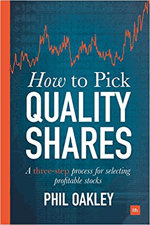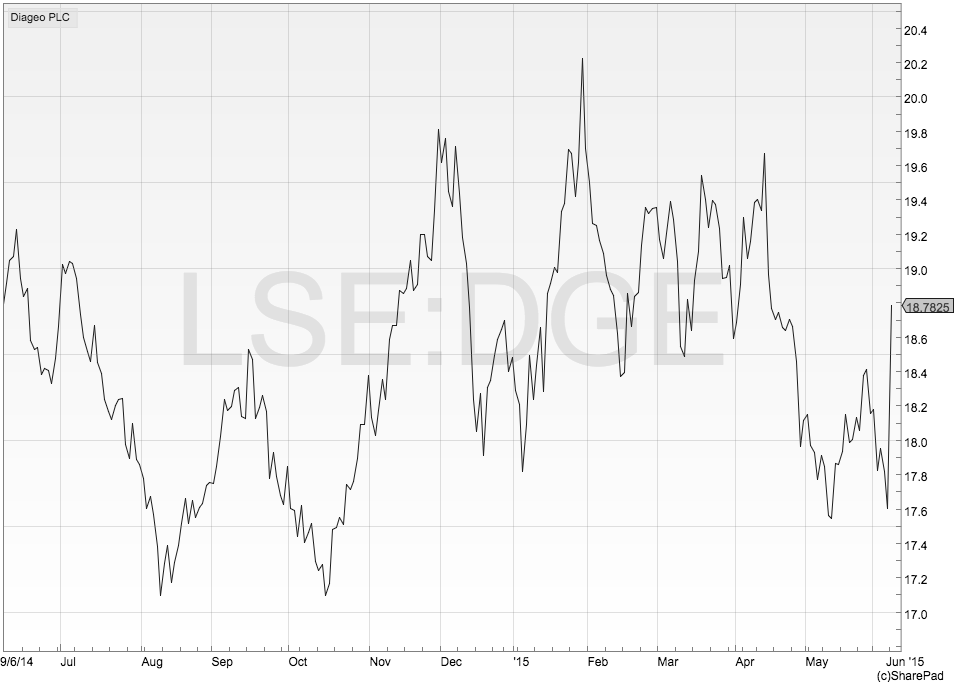Is a takeover of Diageo likely?
Could spirits giant Diageo - the maker of famous drinks such as Johnnie Walker whisky and Guinness beer - be about to be taken over? That's the story doing the rounds over the weekend and this morning.
Rumours that one company might be thinking of taking over another are part and parcel of daily life in the financial markets. Sometimes these rumours are groundless and just market chatter. Some companies like BG for example were touted as a takeover candidate for the best part of twenty years before anything happened.
Sometimes though you can end up kicking yourself for missing something that was obvious with the benefit of hindsight. "Why didn't I spot that?" is a common thought after the event.
Yet, spotting takeover candidates isn't really that complicated. It's sometimes easy to forget that companies are investors too. They are constantly looking for good deals but look for them in a slightly different way to you and me. Instead of weighing up a company on a standalone basis, they are thinking what it might be worth when it is combined with their existing business. If you can think along the same lines then you might be able to spot some winning shares for your portfolio.
Here are some reasons why Diageo might be taken over:
Phil Oakley's debut book - out now!

Phil shares his investment approach in his new book How to Pick Quality Shares. If you've enjoyed his weekly articles, newsletters and Step-by-Step Guide to Stock Analysis, this book is for you.
Share this article with your friends and colleagues:
Big companies find it harder to grow
It is hard for a company that is already big to get much bigger on its own. This is a problem facing most large global consumer goods companies right now. For Diageo to grow by 10% it must add over £1 billion to its annual turnover from its existing assets. That's no easy task in a world where lots of people already use your products.
It is still hard but a lot easier for a company with sales of £100m to find another £10m. Getting more people to drink more spirits has not been easy. Diageo has been spending money on buying other companies in an attempt to grow its profits in recent years. But could the hunter now be the hunted as another big company looks to solve its own growth problem?
Big companies have lots of costs that can be cut
When big companies struggle to grow on their own they often look to buy one of their rivals instead. This has been seen frequently in slow-growing industries such as pharmaceuticals and telecoms.
Companies do this because they can cut out a lot of similar costs - mainly people - whilst keeping hold of all the sales and therefore generate much bigger profits. If the weekend press reports are right and the potential bidder is Brazilian Jorge Paulo Lemann - an expert in cost-cutting who has bought Heinz with Warren Buffett - then a bid for Diageo might not be a far-fetched idea. Especially if he thinks that Diageo has not been run very well and can be made to be a lot more efficient to get higher profit margins.
Diageo is a good business with some great brands
The company has many of the hallmarks of a very good business. Return on capital employed (ROCE) has been consistently around the 20% level backed by a portfolio of world-leading spirits brands. These are assets that lots of people would like to get their hands on.
Investor Sentiment towards Diageo's shares is quite poor
The company has been having a few operational problems with some of its businesses whilst some of its customers are buying less. City analysts expect a sharp fall in EPS this year according to SharePad from 117.1p to 91.2p. Diageo's falling profits have seen investors lose some of their enthusiasm for the shares. They have fallen from just over £20 at the end of January to around £17.60 last week which is not far from its one year low of £17.09 - seen in the middle of October last year. Companies whose shares are experiencing poor sentiment towards them are often vulnerable to a takeover bid. Good investors often pick up shares in quality businesses when they are out of favour.

Here's why it might not happen:
Are the shares cheap enough for a takeover to make sense?
I'm not sure about this. At Friday's closing price of £17.61 the shares were trading on a 2015 PE ratio of 19.3 times - that's not cheap. However, shareholders need to be persuaded to part with their shares. This means that any bidder would have to offer what is known as a takeover premium. If a premium of 25% is needed that would put the price up to £22 or a PE of 24.1 times. That's very high and not unheard of but could only be justified with lots of cost-savings and efficiency gains.
You can weigh up a takeover bid another way by calculating the return on investment for the bidder at a certain price.
At a share price of £22 and just over 2.5 billion shares in issue, Diageo has a market capitalisation of £55.3bn. Add on its borrowings of £7.6bn and a pension fund hole of around £1bn and a buyer would be shelling out an enterprise value of £64bn to buy the company's assets. What would they be getting back in return?
SharePad tells me that Diageo is expected to make an earnings before interest and tax (EBIT) figure in 2015 of £3.1bn. Divide this by £64bn and you get a pre-tax return on investment of just 4.8% which is not very good.
Put another way, to get a respectable return of closer to 10%, a buyer will have to double Diageo's profits which might be very difficult to do or alternatively pay a much lower price for the business. This is why a takeover might not happen now.
If you have found this article of interest, please feel free to share it with your friends and colleagues:
We welcome suggestions for future articles - please email me at analysis@sharescope.co.uk. You can also follow me on Twitter @PhilJOakley. If you'd like to know when a new article or chapter for the Step-by-Step Guide is published, send us your email address using the form at the top of the page. You don't need to be a subscriber.
This article is for educational purposes only. It is not a recommendation to buy or sell shares or other investments. Do your own research before buying or selling any investment or seek professional financial advice.